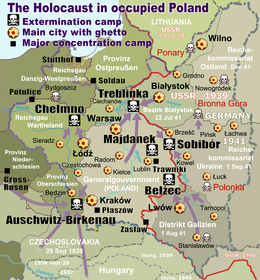Mińsk Mazowiecki Ghetto
| Mińsk Mazowiecki Ghetto | |
|---|---|

|
|
|
Mińsk location south of Treblinka in World War II
|
|
| Also known as | Mińsk Ghetto |
| Location | Mińsk Mazowiecki, German-occupied Poland |
| Date | 25 Oct 1940 – 21 Aug 1942 |
| Incident type | Imprisonment, starvation, mass shooting |
| Organizations | Nazi SS |
| Victims | 7,000 Polish Jews |
| Survivors | 250 |
| Memorials | The Jewish cemetery in Mińsk |
The Mińsk Mazowiecki Ghetto or the Mińsk Ghetto (Polish: Getto w Mińsku Mazowieckim, Yiddish: נאוואמינסק Novominsk) was a World War II ghetto set up by Nazi Germany in occupied Poland. Some 7,000 Polish Jews were imprisoned there from all neighbouring settlements for the purpose of persecution and exploitation. Two years later, beginning 21 August 1942 during the most deadly phase of the Holocaust in occupied Poland, they were rounded up – men, women and children – and deported to Treblinka extermination camp aboard Holocaust trains. In the process of Ghetto liquidation, some 1,300 Jews were summarily executed by the SS in the streets of Mińsk Mazowiecki.
Following the September 1939 Nazi-Soviet invasion of Poland, on 25 October 1940 a ghetto was created in Mińsk 41 kilometres (25 mi) east of Warsaw, around the heavily shelled town square, and along the streets of Siennicka, Nadrzeczna, Mostowa and Warszawska. Some 5,000 Jews were forced to relocate there from all over the city, which was followed by the ghetto expansion with more dispossessed Jews brought in from Kałuszyn, Kalisz, Lipno, and Pabianice. Those confined within the boundaries of the ghetto were allowed starvation rations by the SS for unreasonable amounts of money. Whenever possible, they received help from the non-Jewish Poles on the outside who smuggled food, and passed around kennkartes forged by the underground. Such activity presented a grave danger due to the presence of the German minority in Mińsk serving with the local Sonderdienst battalion (the gun-wielding Sonderdienst were formed by Gauleiter Frank on 6 May 1940). Among the Polish Righteous were Helena and Julian Grobelny, President of Żegota, who harbored over a dozen Jewish activists in their home nearby. There were also Christian Poles executed by the SS under the charge of aiding Jews.
...
Wikipedia

